The Second Parliament of Charles I was summoned by Charles I of England on 26 December 1625 in another attempt to solve his growing monetary problems.
The Second Parliament of Charles I was summoned by Charles I of England on 26 December 1625 in another attempt to solve his growing monetary problems.

The King deliberately set out to secure a more docile body than his 1st Parliament by attempting to reduce the numerical strength of his opponents that were returned to the House of Commons. The main tactic he employed was to ensure that a number of the people who were potentially troublesome MPs were chosen to be sheriffs of their county. [1] This prevented the MPs from being elected to parliament since a sheriff was expected to remain within his county during his period in office.
Charles also raised some other potential trouble makers to aristocratic titles which again made them ineligible for the Commons. Of course, this tactic gave them an automatic place in the House of Lords, which at least one of the new lords used to continue his attacks on Charles’ policies.
The newly chosen members of the House of Commons met for the first time at Westminster on 6 February 1626, a four days after Charles’ coronation. The first business was the election of a Speaker. Having chosen Sir Heneage Finch as Speaker, the Commons then had to decide who would preach to them at their first service in St Margaret's, Westminster, which the Commons preferred to Westminster Abbey because the Abbey services involved rituals with which the Puritans felt uncomfortable. The commons rejected John Donne, Dean of St Paul's and chose instead the Dean of Canterbury. [2] Having decided this weighty issue, the Commons could turn its attention to the other matters facing the country.
Although this session of parliament had been called by the King to address his financial problems, the Commons continued to have other ideas about the country's priorities. The topic they considered most significant was the role of the Duke of Buckingham as the King's advisor. For a while, the issue remained beneath the surface, but a large section of the Commons was determined to attack his authority when the opportunity arose. [3] In the meantime, they once again ensured that the Commons did not grant the King any new taxes while Buckingham remained in office. In the end, it was the opposition of the Commons to Buckingham that led to the dissolution of Parliament.
The Commons were anxious to separate the King from his advisors. To some extent it was a polite fiction that the King was not himself behaving wrongly, but that he was badly advised. However, among many members of parliament there was a genuine dislike for the Duke of Buckingham. Buckingham had originally been a favourite of James I and had a great deal of contact with Charles while he was growing up. With the accession of Charles as king, Buckingham began to play an ever-growing role in the formulation and execution of policy. The Commons openly criticised him and would not provide the King with money until their complaints about him had been addressed. On 18 March, the house considered the report from the committee for evils, causes and remedies which put forward six complaints about the Duke of Buckingham.
Charles attempted to intimidate the Commons into granting him his revenue before it considered Buckingham's impeachment. [4] However, the members of the Commons were in no mood to back down. Instead, the attacks on Buckingham intensified. On 15 June, Charles I dissolved the parliament of 1626 before it had voted him any significant new money in order to prevent Buckingham being impeached. When asked by a group of Peers to delay the dissolution, Charles replied “not by a second”.

Charles I was King of England, Scotland, and Ireland from 27 March 1625 until his execution in 1649.
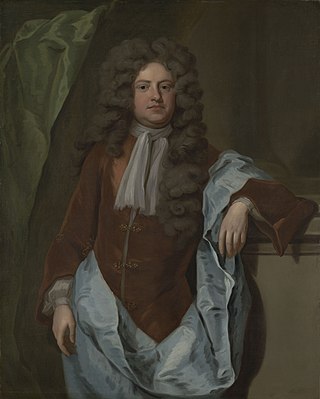
Charles Montagu, 1st Earl of Halifax, was an English statesman and poet. He was the grandson of the 1st Earl of Manchester and was eventually ennobled himself, first as Baron Halifax in 1700 and later as Earl of Halifax in 1714. As one of the four members of the so-called Whig Junto, Montagu played a major role in English politics under the reigns of King William III and Queen Anne. He served as Chancellor of the Exchequer from 1694 to 1699 and as First Lord of the Treasury from 1714 until his death the following year. He was also president of the Royal Society and a patron of the scientist Isaac Newton.

George Villiers, 1st Duke of Buckingham, KG, was an English courtier, statesman, and patron of the arts. He was a favourite and self-described "lover" of King James VI and I. Buckingham remained at the height of royal favour for the first three years of the reign of James's son, King Charles I, until he was assassinated.
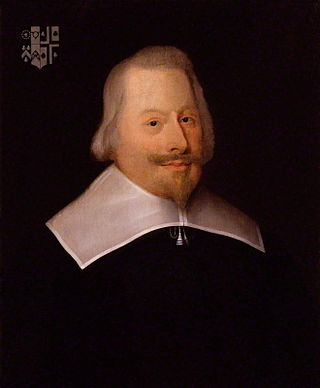
John Pym was a politician and administrator from London, who played a major role in establishing what would become the modern English Parliamentary system. One of the Five Members whose attempted arrest in January 1642 was a major step in sparking the First English Civil War, his use of procedure to out manoeuvre opponents was unusual for the period. Though this meant he was respected by contemporaries rather than admired, in 1895 historian Goldwin Smith described him as "the greatest member of Parliament that ever lived".

Denzil Holles, 1st Baron Holles, was an English statesman, best remembered as one of the Five Members whose attempted arrest by Charles I in January 1642 sparked the First English Civil War.

Thomas Wentworth, 1st Earl of Strafford,, was an English statesman and a major figure in the period leading up to the English Civil War. He served in Parliament and was a supporter of King Charles I. From 1632 to 1640 he was Lord Deputy of Ireland, where he established a strong authoritarian rule. Recalled to England, he became a leading advisor to the King, attempting to strengthen the royal position against Parliament. When Parliament condemned Lord Strafford to death, Charles reluctantly signed the death warrant and Strafford was executed. He had been advanced several times in the Peerage of England during his career, being created 1st Baron Wentworth in 1628, 1st Viscount Wentworth in late 1628 or early 1629, and, finally, 1st Earl of Strafford in January 1640. He was known as Sir Thomas Wentworth, 2nd Baronet, between 1614 and 1628.

The Cavalier Parliament of England lasted from 8 May 1661 until 24 January 1679. It was the longest English Parliament, and longer than any Great British or UK Parliament to date, enduring for nearly 18 years of the quarter-century reign of Charles II of England. Like its predecessor, the Convention Parliament, it was overwhelmingly Royalist and is also known as the Pensioner Parliament for the many pensions it granted to adherents of the King.

Anthony Ashley Cooper, 1st Earl of Shaftesbury PC, FRS, was an English statesman and peer. He held senior political office under both the Commonwealth of England and Charles II, serving as Chancellor of the Exchequer from 1661 to 1672 and Lord Chancellor from 1672 to 1673. During the Exclusion Crisis, Shaftesbury headed the movement to bar the Catholic heir, James II, from the royal succession, which is often seen as the origin of the Whig party. He was also a patron of the political philosopher John Locke, with whom Shaftesbury collaborated with in writing the Fundamental Constitutions of Carolina in 1669.

Thomas Osborne, 1st Duke of Leeds, was an English Tory politician and peer. During the reign of Charles II of England, he was the leading figure in the English government for roughly five years in the mid-1670s. Osborne fell out of favour due to corruption and other scandals. He was impeached and eventually imprisoned in the Tower of London for five years until James II of England acceded in 1685. In 1688, he was one of the Immortal Seven who invited William of Orange to depose James II during the Glorious Revolution. Osborne was again the leading figure in England's government for a few years in the early 1690s before dying in 1712.
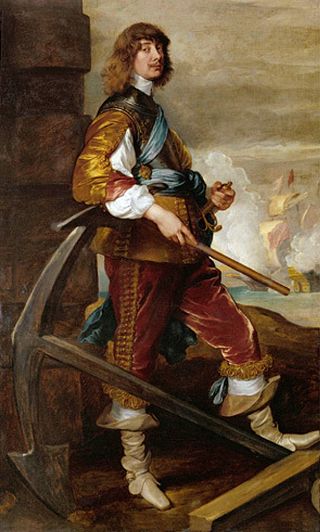
Algernon Percy, 10th Earl of Northumberland, 4th Baron Percy,, was an English aristocrat, and supporter of the Parliamentary cause in the First English Civil War.

Lionel Cranfield, 1st Earl of Middlesex was an English merchant and politician. He sat in the House of Commons between 1614 and 1622 when he was raised to the peerage as Baron Cranfield.
Francis Mitchell was the last English knight of the realm to be publicly degraded, after being found guilty of extorting money from licensees following his being granted monopoly on the licensing of inns by George Villiers, 1st Duke of Buckingham and James I.

The Cádiz expedition of 1625 was a naval expedition against Spain by English and Dutch forces. The plan was put forward because after the Dissolution of the Parliament of 1625, the Duke of Buckingham, Lord High Admiral, wanted to undertake an expedition that would match the exploits of the raiders of the Elizabethan era and in doing so, would return respect to the country and its people after the political stress of the preceding years. It was a major fiasco resulting in a Spanish victory.
Sir William Armine, 1st Baronet was an English politician who sat in the House of Commons at various times between 1621 and 1651. He supported the Parliamentary cause in the English Civil War.

Sir RanulphCrew(e) was an English judge and Chief Justice of the King's Bench.
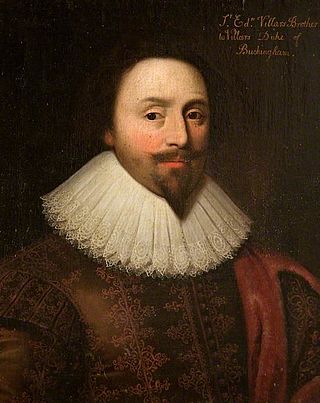
Sir Edward Villiers was an English nobleman from Leicestershire and member of the Villiers family, whose younger half-brother George Villiers, 1st Duke of Buckingham, was a favourite of both James VI and I and his son Charles. Through his influence, Sir Edward gained various positions, including Master of the Mint, Member of Parliament for Westminster and Lord President of Munster. He died in Ireland in September 1626.
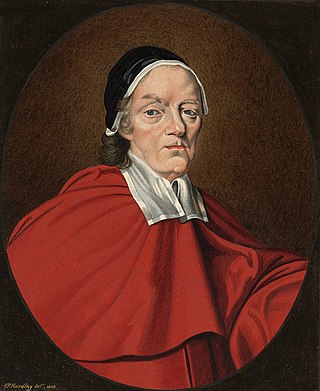
Sir John Maynard KS was an English lawyer and politician, prominent under the reigns of Charles I, the Commonwealth, Charles II, James II and William III.
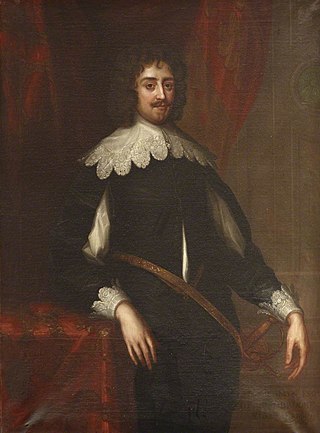
Thomas Jermyn was an English courtier and politician who sat in the House of Commons for various seats between 1625 and 1644. He supported the Royalist cause in the English Civil War.

The Useless Parliament was the first Parliament of England of the reign of King Charles I, sitting only from June until August 1625. It gained its name because it transacted no significant business, making it 'useless' from the king's point of view. Parliament adjourned to Oxford on 1 August, and was dissolved on 12 August, having offended the king.

The 3rd Parliament of King Charles I was summoned by King Charles I of England on 31 January 1628 and first assembled on 17 March 1628. The elected Speaker of the House of Commons was Sir John Finch, the Member of Parliament for Canterbury.